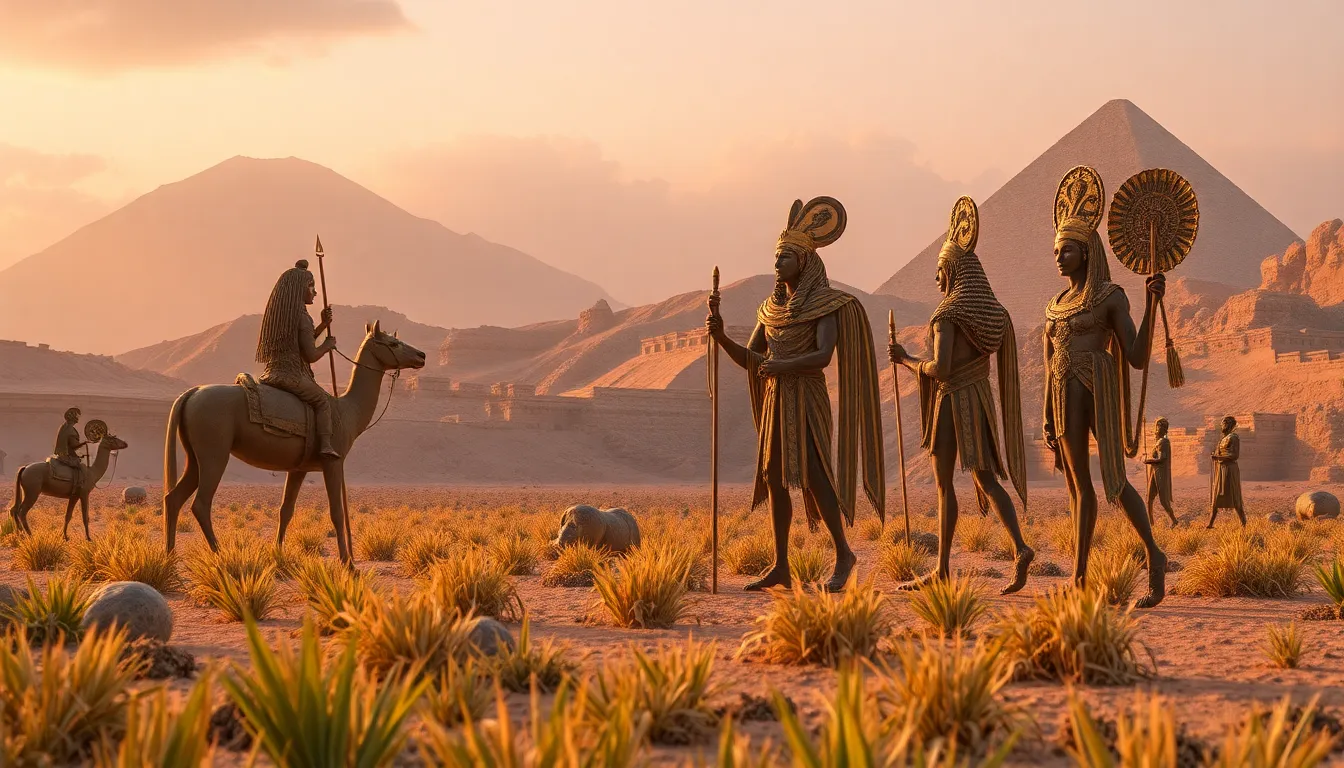The Role of the Gods in Egyptian Agricultural Cycles
I. Introduction
Ancient Egyptian civilization was heavily reliant on agriculture, which was the backbone of its economy and society. The fertile lands along the Nile River provided the essential resources needed for cultivation, allowing the Egyptians to thrive.
Agriculture was not just a means of sustenance, but it also held significant social and cultural importance. The agricultural calendar dictated many aspects of daily life, from labor to festivals. Central to these practices were the deities that the Egyptians believed controlled agricultural cycles, reflecting their deep connection with the divine.
II. The Significance of the Nile River
The Nile River was regarded as the lifeblood of Egyptian agriculture. Its annual flooding deposited nutrient-rich silt onto the surrounding fields, creating ideal conditions for planting crops. This phenomenon was essential for sustaining agricultural production in an otherwise arid environment.
The seasonal flooding of the Nile, known as Inundation, was a critical event that dictated planting and harvesting times. The Egyptians celebrated this cycle, recognizing its importance to their survival and prosperity. The river’s connection to the gods was evident, as they believed that divine forces controlled its flow and fertility.
III. Key Deities Associated with Agriculture
A. Osiris: God of fertility and the afterlife
Osiris was one of the most significant deities in the Egyptian pantheon, representing fertility, resurrection, and the afterlife. He was often depicted as a green-skinned man, symbolizing rebirth and regeneration, closely associated with the fertility of the earth.
- Mythology and symbolism: Osiris’s myth involves his death and resurrection, which symbolizes the cyclical nature of agricultural life—death and rebirth in the fields.
- Worship practices and rituals: The Egyptians held various festivals in his honor, particularly during the harvest season, to seek his blessings for abundance.
B. Isis: Goddess of motherhood and fertility
Isis, the wife of Osiris, was revered as the goddess of motherhood, fertility, and magic. Her nurturing qualities made her a central figure in agricultural practices.
- Her role in agricultural cycles: Isis was believed to assist in the growth of crops and protect the fertility of the land.
- Festivals and offerings to Isis: Egyptians celebrated the festival of Shemu, dedicated to the harvest, where they offered grains and fruits to Isis for her blessings.
C. Hapi: God of the Nile and fertility
Hapi, depicted as a well-fed man with a large belly, represented the fertility of the Nile and was essential to the agricultural success of Egypt.
- Representations and significance: Hapi was often shown with plants and flowers, symbolizing abundance and the life-giving properties of the Nile.
- Rituals to honor Hapi during flooding: The Egyptians performed rituals to thank Hapi for the inundation of the Nile, which ensured their crops would thrive.
IV. Agricultural Festivals and Religious Practices
Agricultural festivals were integral to the Egyptian calendar, celebrating the various stages of farming and honoring the deities associated with them. Major festivals included:
- The Wepet-Renenet Festival, celebrating the first harvest.
- The Festival of the Nile, marking the start of the inundation season.
Rituals performed during these festivals included offerings of food, music, and dance, aimed at ensuring a good harvest. The community came together to seek divine favor, reinforcing the relationship between the people and the gods.
V. Myths Explaining Agricultural Cycles
Creation myths and stories of the gods provided explanations for the agricultural cycles. These narratives often illustrated the interplay between life and death, growth and decay. For instance:
- Creation myths related to agriculture often depicted gods like Osiris teaching humanity how to farm.
- Stories of deities influencing the growth and decay of crops highlighted the belief that these gods directly affected agricultural success.
The symbolic meaning of seasonal changes was also reflected in these myths, with the flooding of the Nile representing death and rebirth in the agricultural cycle.
VI. Temples and Sacred Spaces
Temples played a crucial role in agricultural worship, serving as centers for religious activities and rituals. They were often located near fertile lands and were responsible for managing agricultural practices.
- Role of temples in agricultural worship: Temples were dedicated to deities like Osiris and Isis, where priests conducted rituals to ensure favorable conditions for crops.
- Agricultural land managed by temples: Many temples owned vast tracts of land, employing farmers and laborers to cultivate crops for both sustenance and offerings.
- The influence of priests in farming practices: Priests played a vital role in advising farmers on agricultural techniques, emphasizing the importance of divine favor in their work.
VII. Impact of Beliefs on Agricultural Techniques
The religious beliefs of the Egyptians significantly shaped their farming practices. Farmers often incorporated rituals and prayers into their daily work, reflecting their reliance on the gods for success.
- How religious beliefs shaped farming practices: Farmers would consult priests for guidance on the best times to plant and harvest based on divine calendars.
- Use of rituals and prayers in daily agricultural work: Daily offerings and prayers were made to the gods to seek their blessing on crops.
- The balance between divine favor and human effort: While the Egyptians acknowledged the importance of divine assistance, they also recognized the need for hard work and dedication in agriculture.
VIII. Conclusion
The gods of ancient Egypt played a pivotal role in shaping agricultural cycles, reflecting the civilization’s deep connection to the land and the divine. Their influence is evident in the myths, rituals, and practices that characterized Egyptian agriculture, highlighting the interplay between religion and daily life.
The lasting legacy of these beliefs can still be observed in modern agricultural practices, where communities often honor nature and the divine in various forms. The intersection of religion and agriculture in ancient Egypt serves as a reminder of the importance of respect for the environment and the forces that sustain life.




